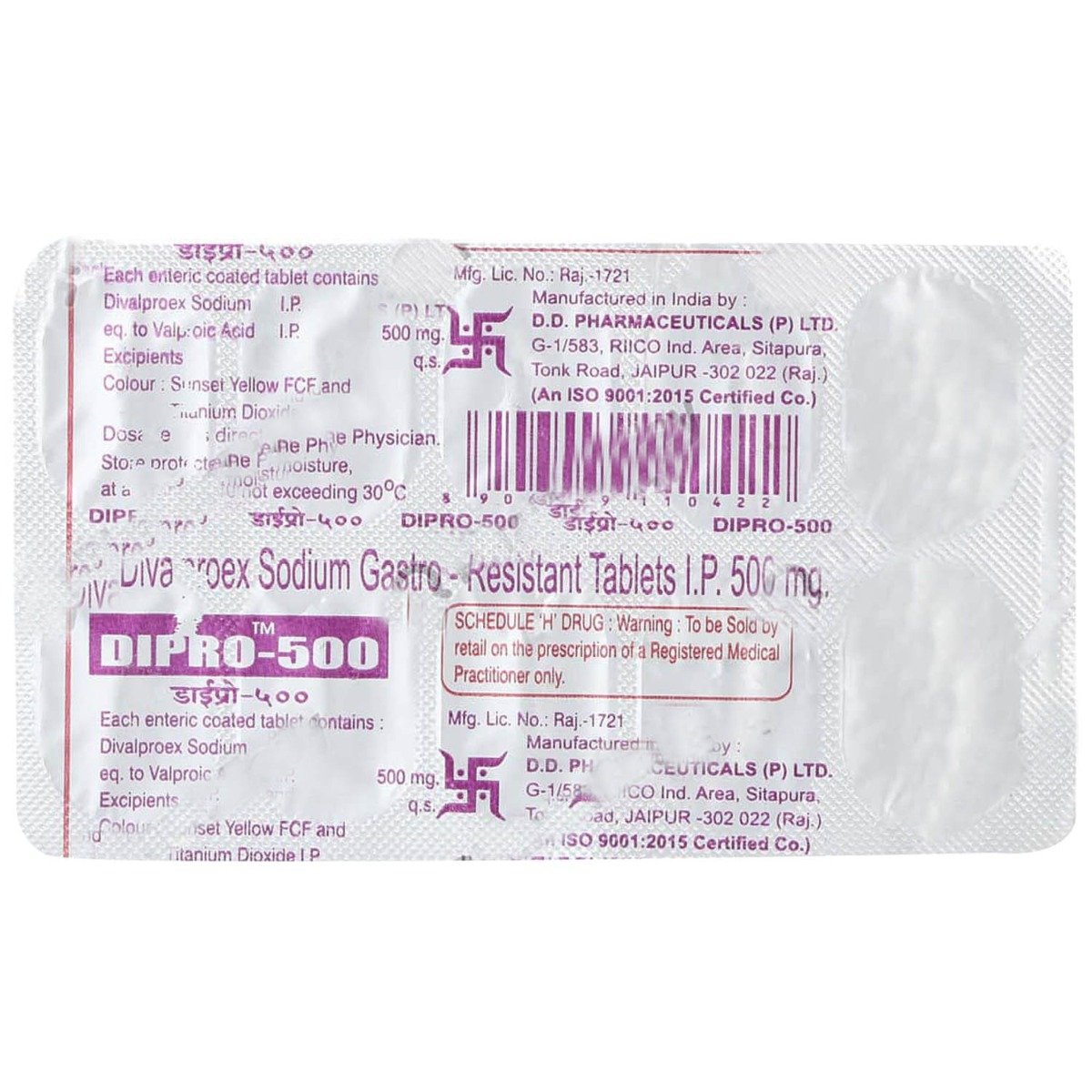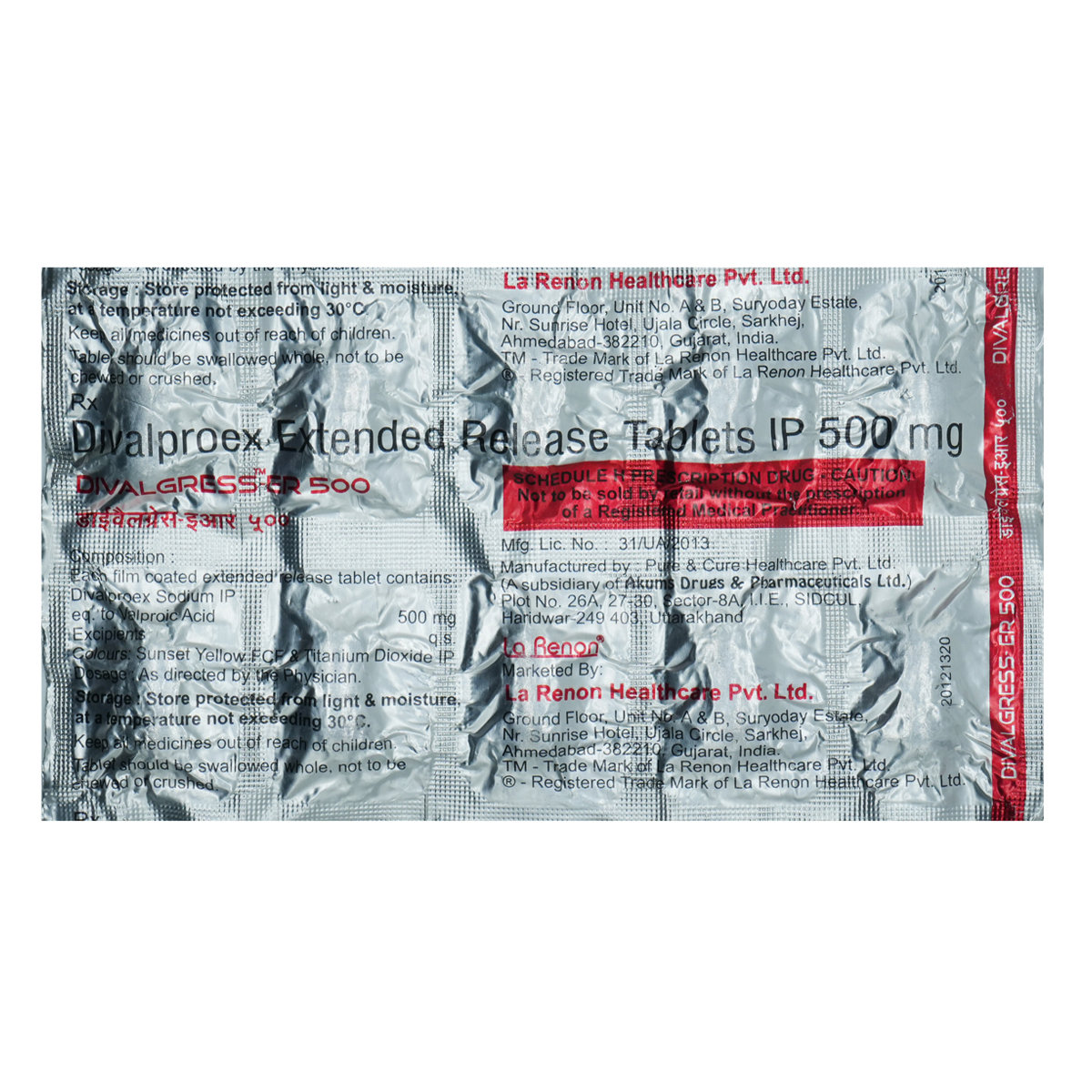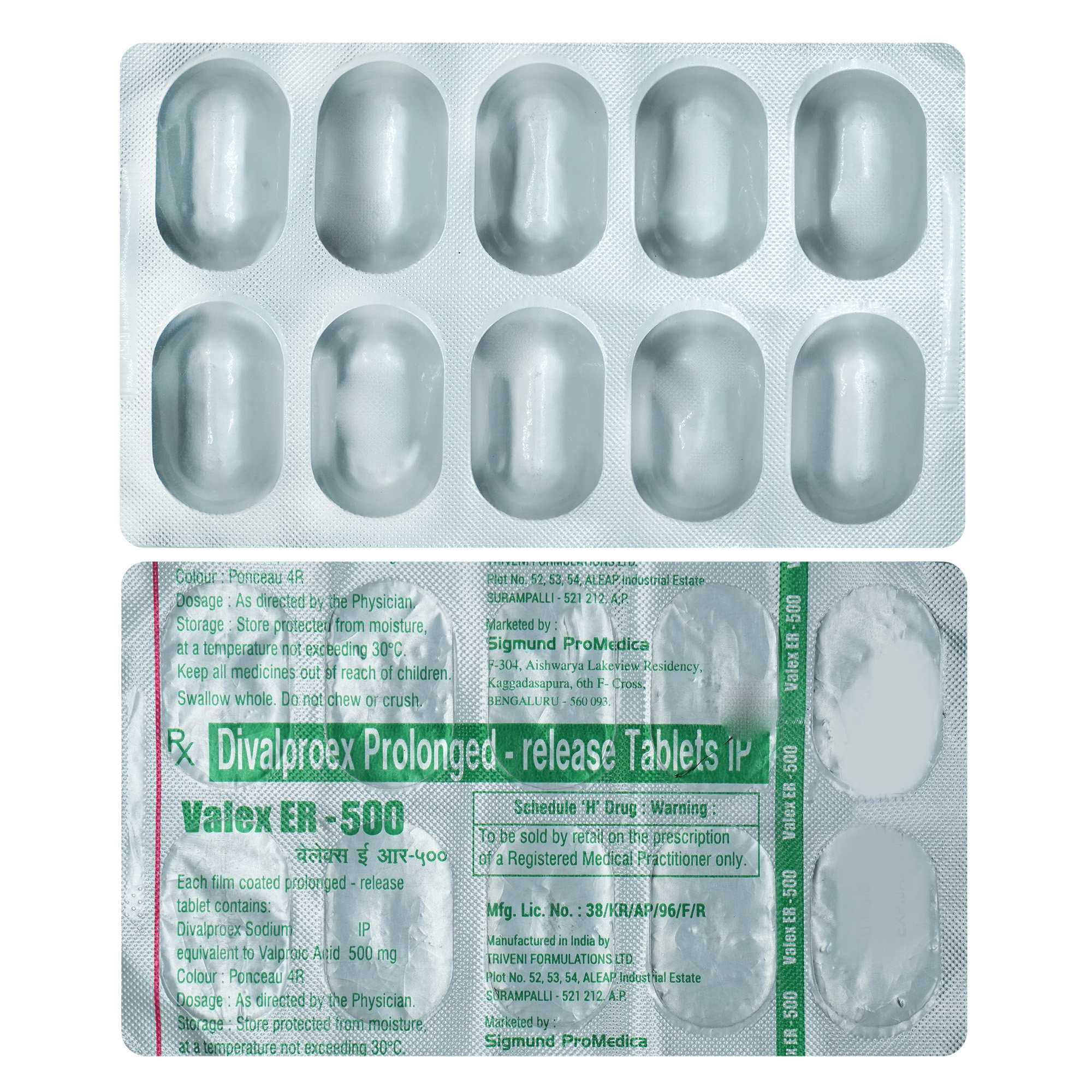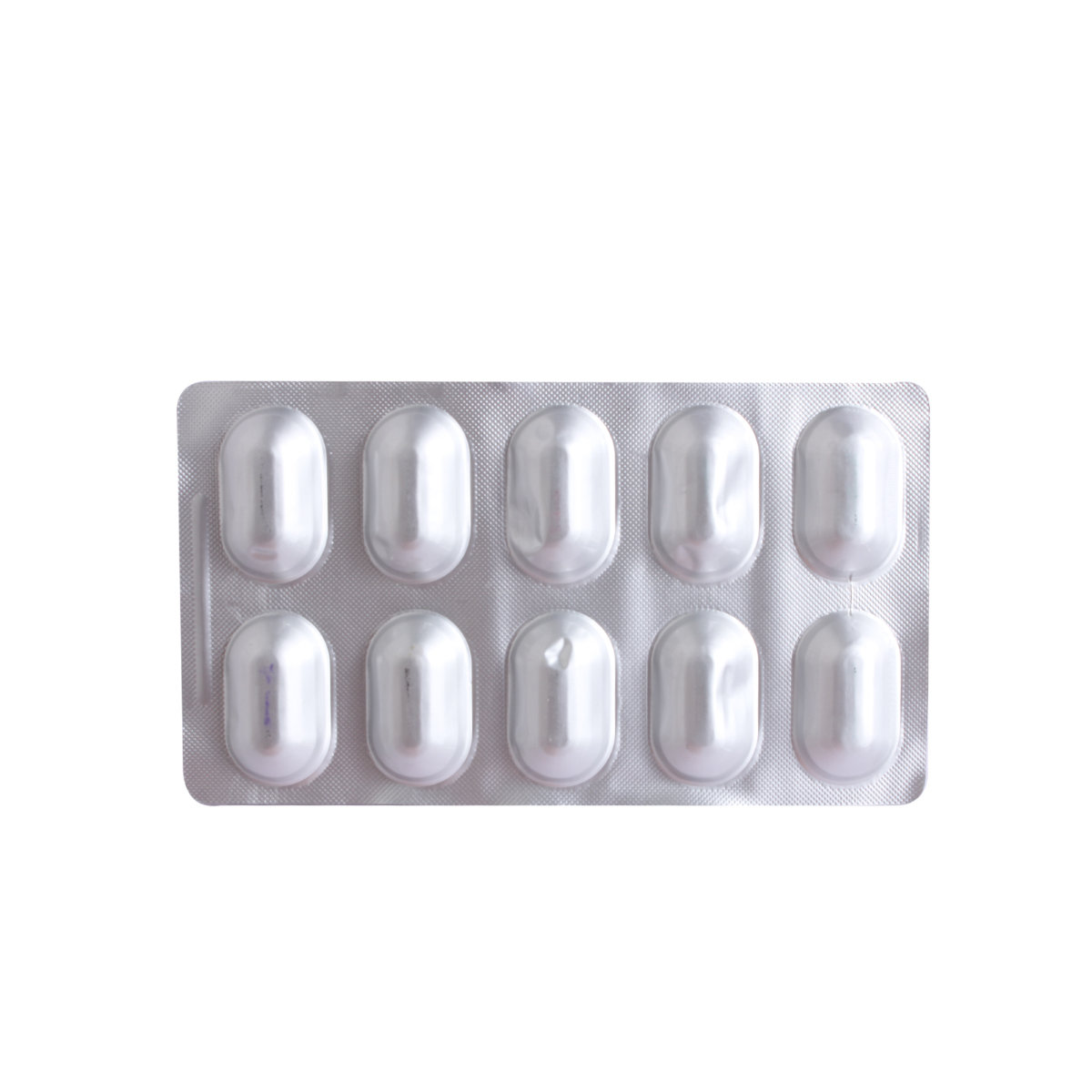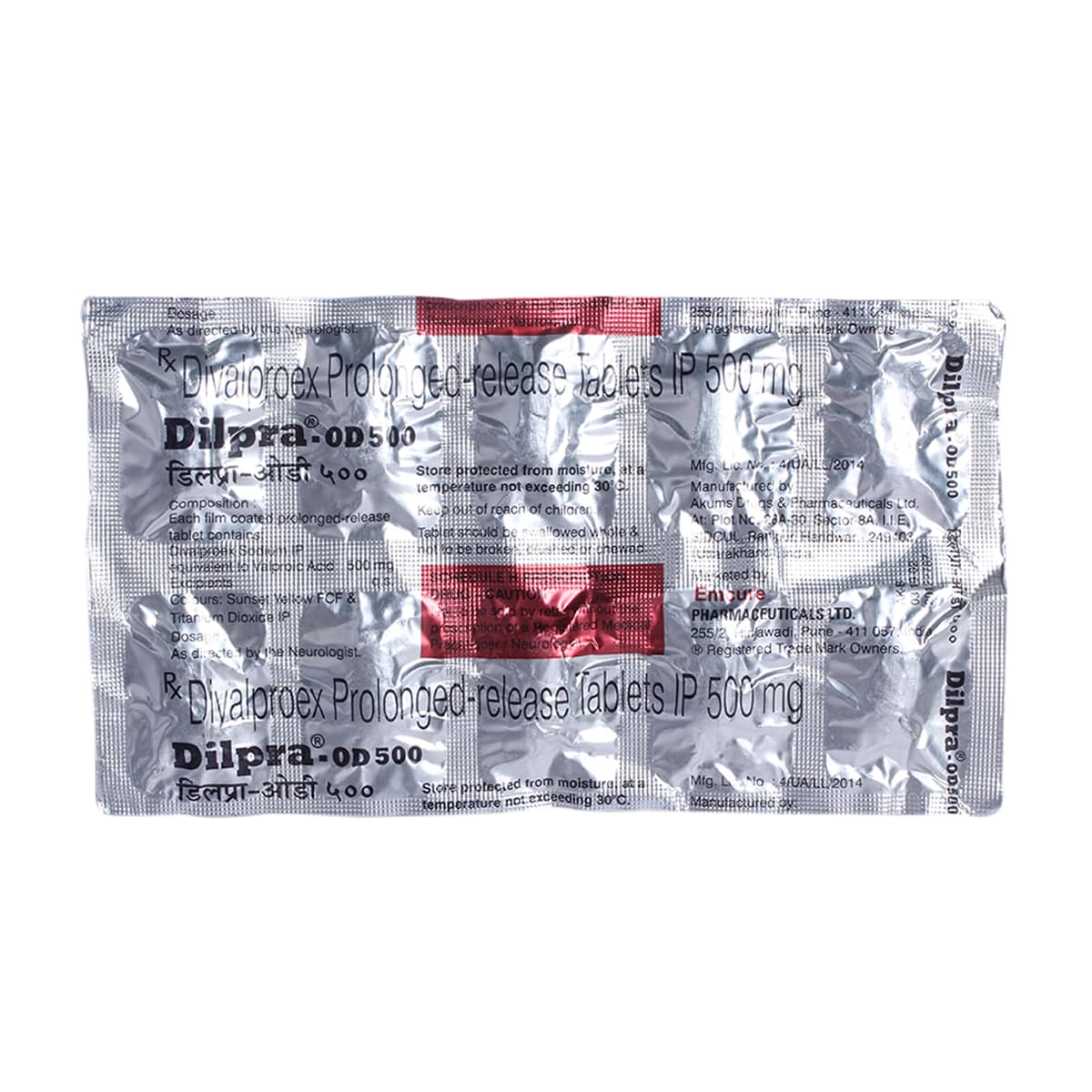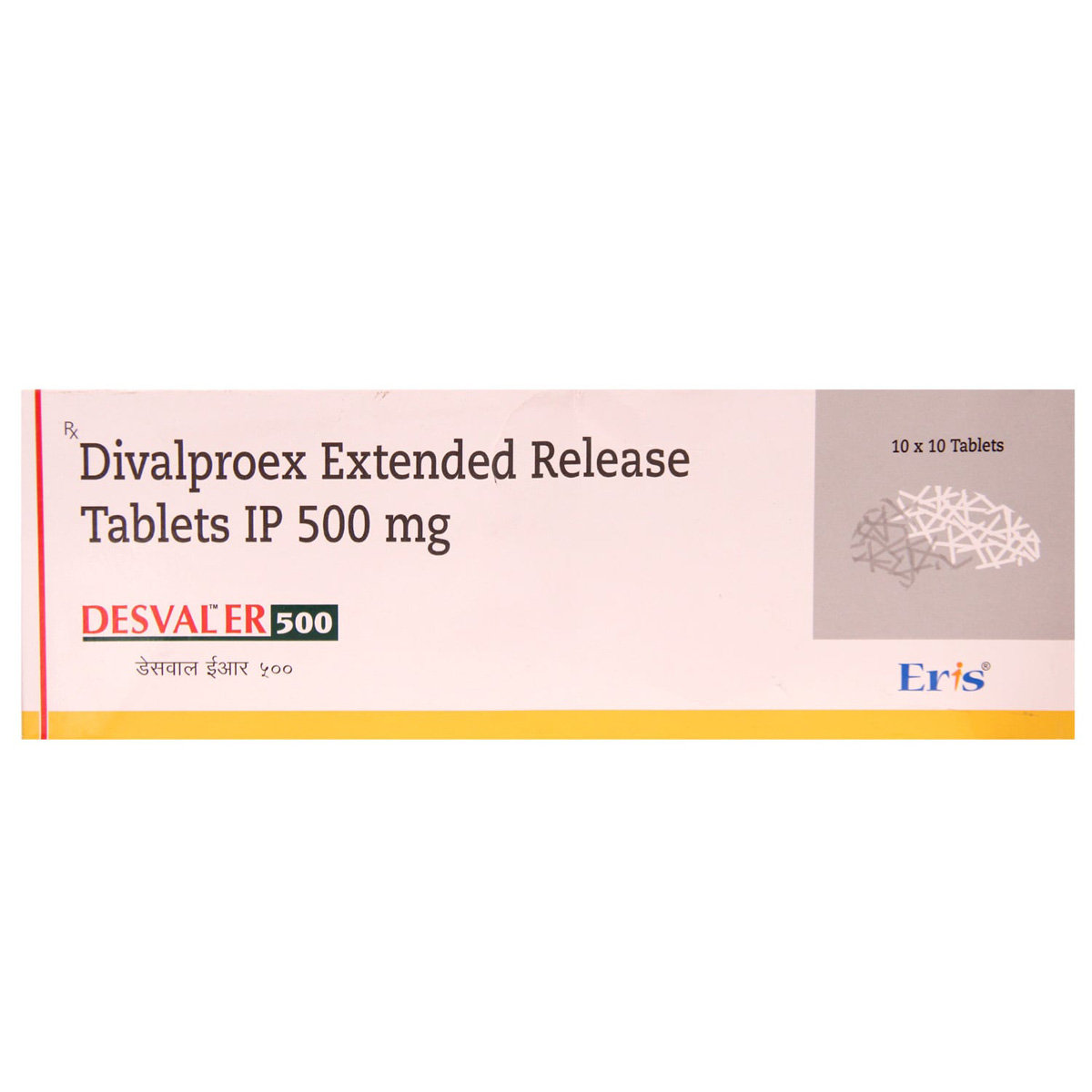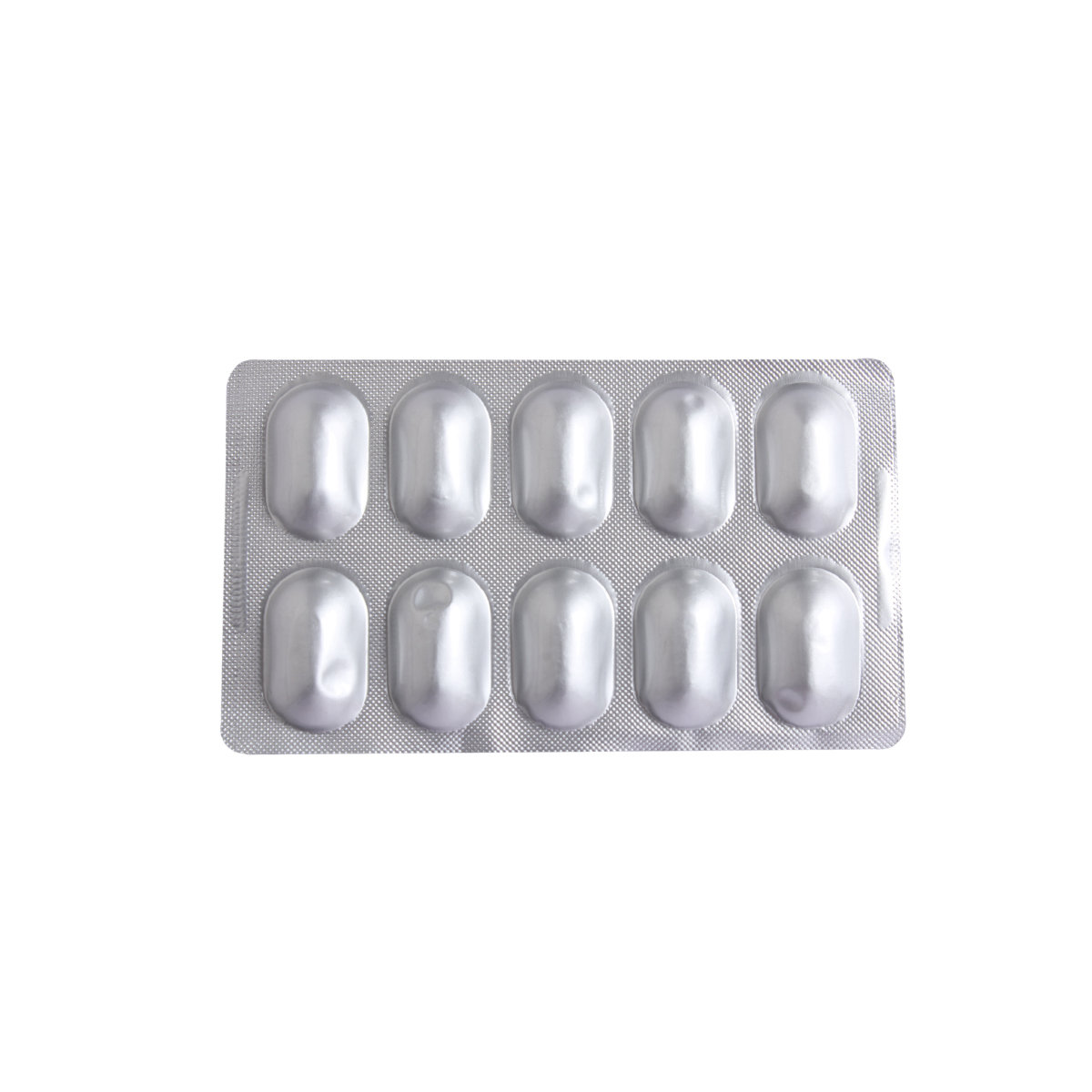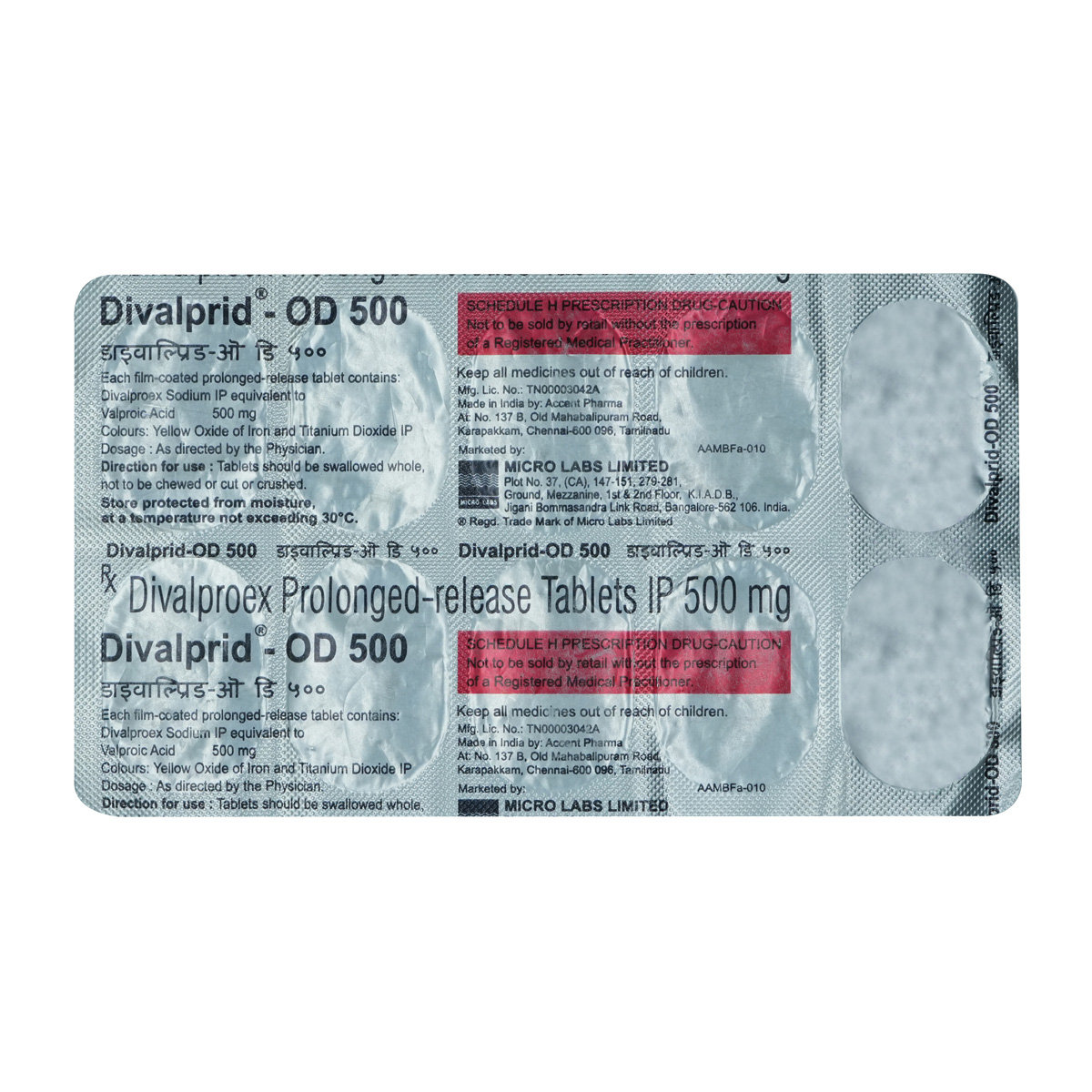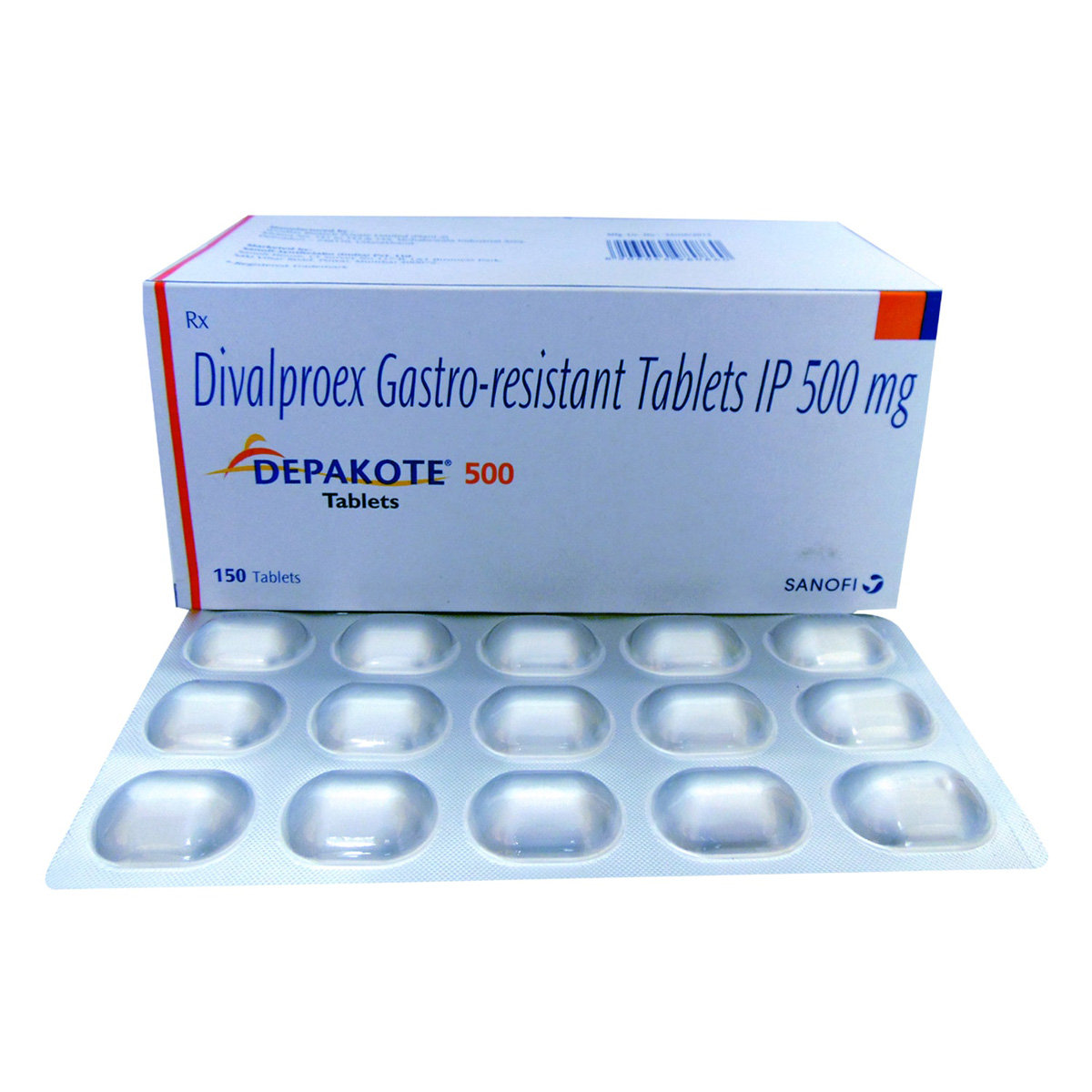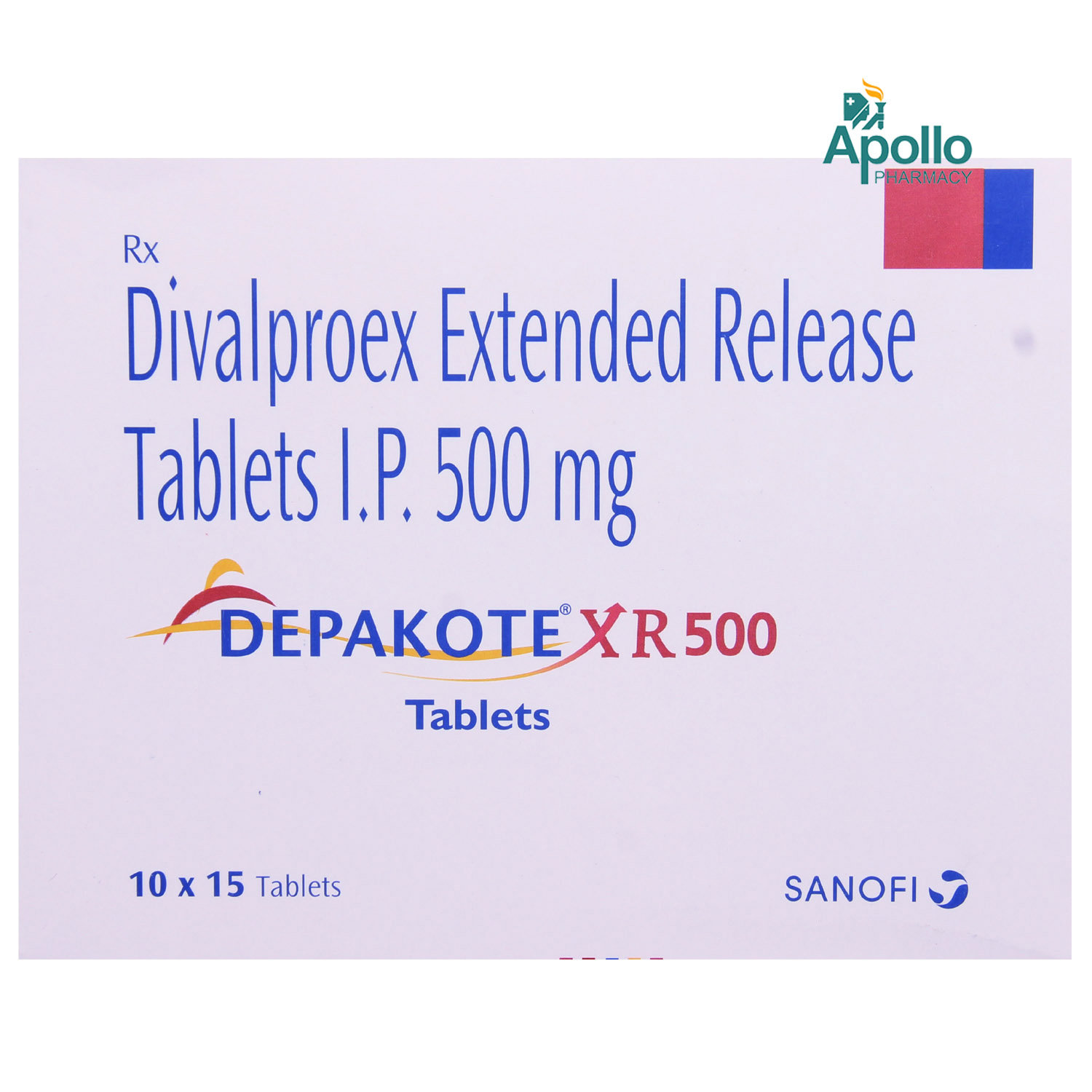Dixval-500 mg Tablet 10's


MRP ₹103
(Inclusive of all Taxes)
₹15.4 Cashback (15%)
Provide Delivery Location
Online payment accepted
 Prescription drug
Prescription drugWhats That
Composition :
Manufacturer/Marketer :
Consume Type :
Expires on or after :
Return Policy :
About Dixval-500 mg Tablet
Dixval-500 mg Tablet belongs to a group of medicines called anticonvulsants or anti-epileptics used to treat epilepsy/seizures/fits. Additionally, Dixval-500 mg Tablet is also used to treat manic episodes associated with bipolar disorder and prevent migraines. Epilepsy is a sudden rush of electricity in the brain. In epilepsy, the brain's electrical rhythms become imbalanced, resulting in recurrent seizures.
Dixval-500 mg Tablet contains 'Divalproex', which decreases the brain's excessive and abnormal nerve activity. Thereby helping in controlling seizures. Dixval-500 mg Tablet increases the amount of a chemical substance called GABA; this helps block the nerve transmission across the brain and provides a calming effect. Thereby helping treat bipolar disorder.
Take Dixval-500 mg Tablet with or without food. Depending on your medical condition, you are advised to take Dixval-500 mg Tablet for as long as your doctor has prescribed it for you. In some cases, you may experience certain common side-effects such as abdominal pain, back pain, constipation, diarrhoea, dizziness, nausea, increased appetite, and vomiting. Most of these side effects do not require medical attention and will resolve gradually over time. However, you are advised to talk to your doctor if you experience these side effects persistently.
Please do not stop taking Dixval-500 mg Tablet without consulting your doctor to avoid worsening seizures. Do not take Dixval-500 mg Tablet if you are pregnant, as it could cause serious birth defects. If you are of childbearing age, use effective contraception while taking Dixval-500 mg Tablet . Consult your doctor before taking Dixval-500 mg Tablet if you are breastfeeding. Avoid driving or operating machinery as Dixval-500 mg Tablet causes dizziness and may affect thinking and motor skills. Avoid consuming alcohol along with Dixval-500 mg Tablet as it could lead to increased dizziness. Care should be taken while giving Dixval-500 mg Tablet to children below two years as there is a higher risk of liver intoxication during the first 6months of treatment. Keep your doctor informed about your health condition and medicines to rule out any side effects.
Uses of Dixval-500 mg Tablet
Directions for Use
Key Benefits
Dixval-500 mg Tablet belongs to a group of medicines called anticonvulsants or anti-epileptics. Dixval-500 mg Tablet is used to treat epilepsy/seizures/fits. Also, Dixval-500 mg Tablet is used to treat mood disorders and prevent migraine headaches. Dixval-500 mg Tablet decreases the excessive and abnormal nerve activity in the brain. Thereby helping in controlling seizures. Dixval-500 mg Tablet treats mood disorders by increasing the amount of a chemical substance called GABA; this helps block the nerve transmission across the brain and provides a calming effect. Dixval-500 mg Tablet prevents migraine headaches by limiting the transmission of nerve pain. Dixval-500 mg Tablet is used alone or in combination to treat simple, complex partial, and complex absence seizures. Dixval-500 mg Tablet is used in combination to treat multiple seizures, such as absence seizures.
Storage
- Reduce salt intake to minimize fluid buildup.
- Use compression stockings, sleeves, or gloves.
- Gently massage the affected area towards the heart.
- Protect the swollen area from injury and keep it clean.
- Use lotion or cream to keep the skin moisturized.
- Do not stand up suddenly. Lie down and get up slowly only when you feel better.
- Avoid alcohol and large meals.
- Drink enough water before standing for long periods.
- Exercise regularly; however, avoid exercising in extreme heat.
- Eat small, low-carb meals.
- Wear compression stockings.
- Contact your doctor immediately if you're experiencing a fast heart rate, palpitations, or other heart-related symptoms. This is crucial to determine whether the symptoms are related to your medication.
- Your doctor may need to adjust your medication regimen to alleviate the fast heart rate symptoms. This could involve changing the medication, reducing the dosage, or adding new medications to counteract the side effects.
- Follow your doctor's advice on monitoring your heart rate and blood pressure. This will help track any changes and ensure your heart rate returns normal.
- If you experience severe symptoms such as chest pain, dizziness, or shortness of breath, seek immediate medical attention. These symptoms can indicate a more serious condition that requires prompt treatment.
- Regular exercise increases nitric oxide, relaxing blood vessels and improving circulation.
- Avoid smoking and alcohol consumption as they can damage blood vessels and worsen vasodilation.
- Foods high in omega-3 fatty acids such as walnuts, flaxseeds and fatty fish improve cardiovascular health and lower inflammation.
- Limit the amount of salt in your regular diet.
- Avoid triggers like alcohol, caffeine, and energy drinks.
- Try relaxation techniques such as yoga, meditation, or deep breathing.
- Exercise regularly as it helps maintain heart health.
- Follow a nutritious and balanced diet.
- Hallucination is a major psychotic disorder that needs immediate medical attention.
- Acknowledge your experience and put effort to control hallucinations. You can share what is being seen with a therapist to know whether they are real or imaginary.
- Avoid smoking and alcohol intake as it can worsen the condition and increase your imagination.
- Practice meditation and yoga to avoid anxiety, which can be one of the leading causes of hallucinations.
- Talk to your dietician and consume food that can improve your mental health.
Drug Warnings
Do not take Dixval-500 mg Tablet if you are allergic to any of its contents, have/ had liver problems or urea cycle disorders. Inform your doctor before taking Dixval-500 mg Tablet if you have pancreatitis, blood problems or multi-organ hypersensitivity. Consult your doctor immediately if you experience suicidal tendencies while taking Dixval-500 mg Tablet . Dixval-500 mg Tablet may cause thrombocytopenia (low blood platelets), hyperammonemia (high levels of ammonia in the blood), hypothermia (low body temperature) and liver problems. Please do not stop taking Dixval-500 mg Tablet without consulting your doctor to avoid worsening of seizures. Do not take Dixval-500 mg Tablet if you are pregnant, as it could cause serious birth defects. If you are of childbearing age, use effective contraception while taking Dixval-500 mg Tablet . Consult your doctor before taking Dixval-500 mg Tablet if you are breastfeeding. Avoid driving or operating machinery as Dixval-500 mg Tablet causes dizziness and may affect thinking and motor skills. Avoid consuming alcohol along with Dixval-500 mg Tablet as it could lead to increased dizziness. Care should be taken while giving Dixval-500 mg Tablet to children below 2 years as there is a higher risk of liver intoxication during the first six months of treatment.
Drug-Drug Interactions
Drug-Drug Interactions
Login/Sign Up
Combining Sodium phenylbutyrate and Dixval-500 mg Tablet can increase ammonia levels in the blood.
How to manage the interaction:
Taking Sodium phenylbutyrate with Dixval-500 mg Tablet is not recommended, but it can be taken if prescribed by a doctor. If you experience any symptoms like sudden dizziness, lightheadedness, fainting, headache, shortness of breath, nausea, vomiting, chest pain or tightness, rapid heartbeat, or memory loss, contact your doctor immediately. Do not discontinue any medications without consulting a doctor.
Co-administration of Teriflunomide and Dixval-500 mg Tablet can increase the risk of causing liver problems.
How to manage the interaction:
Co-administration of Teriflunomide and Dixval-500 mg Tablet can lead to an interaction, it can be taken if advised by your doctor. However, if you experience any symptoms like fever, chills, joint pain or swelling, unusual bleeding or bruising, skin rash, itching, loss of appetite, fatigue, nausea, vomiting, abdominal pain, dark-colored urine, light-colored stools, and yellowing of the skin or eyes. Avoid alcohol while taking these medications, and consult your doctor immediately. Do not discontinue any medications without consulting your doctor.
Co-administration of Lithium with Dixval-500 mg Tablet can increase the risk irregular heart rhythm.
How to manage the interaction:
Co-administration of Lithium and Dixval-500 mg Tablet can lead to an interaction, but it can be taken if advised by your doctor. However, consult your doctor immediately if you experience any symptoms like dizziness, drowsiness, confusion, lightheadedness, fainting, shortness of breath, chest pain or tightness, rapid heartbeat, and difficulty concentrating. Do not discontinue any medications without consulting a doctor.
Co-administration of Dixval-500 mg Tablet with doripenem can reduce the blood levels of valproic acid.
How to manage the interaction:
Co-administration of Doripenam and Dixval-500 mg Tablet can lead to an interaction, it can be taken if advised by your doctor. However, if you experience sudden dizziness, lightheadedness, fainting, shortness of breath, chest pain or tightness, rapid heartbeat, involuntary muscle movements, or memory loss, contact your doctor immediately. Do not discontinue any medications without consulting a doctor.
Co-administration of Leflunomide and Dixval-500 mg Tablet can increase the risk of causing liver problems.
How to manage the interaction:
Co-administration of Leflunomide and Dixval-500 mg Tablet can lead to an interaction, they can be taken together if prescribed by a doctor. However, if you experience fever, chills, joint pain or swelling, unusual bleeding or bruising, skin rash, itching, less desire to eat, fatigue, nausea, vomiting, abdominal pain, or yellowing of the skin or eyes, contact a doctor immediately. Do not discontinue any medications without consulting a doctor.
The combined use of Ertapenem and Dixval-500 mg Tablet can reduce the blood levels of valproic acid.
How to manage the interaction:
Co-administration of Ertapenem and Dixval-500 mg Tablet can lead to an interaction, it can be taken if advised by your doctor. However, if you experience any symptoms like loss of seizure control or changes in behavior, consult your doctor immediately. Do not discontinue any medications without consulting the doctor.
Co-administration of Ketamine and Dixval-500 mg Tablet can increase side effects and cause respiratory depression.
How to manage the interaction:
Co-administration of Ketamine and Dixval-500 mg Tablet can lead to an interaction, but it can be taken if your doctor advises. However, consult your doctor immediately if you experience any symptoms like dizziness, drowsiness, confusion, difficulty concentrating, excessive sedation, impaired thinking, judgment, and motor coordination. Avoid driving or operating hazardous machinery until you know how these medications affect you. Do not discontinue any medications without consulting the doctor.
Co-administration of Meropenam and Dixval-500 mg Tablet together can reduce the effect of Dixval-500 mg Tablet.
How to manage the interaction:
Co-administration of Meropenam and Dixval-500 mg Tablet can lead to an interaction, but it can be taken if your doctor advises. However, if you experience any unusual symptoms, consult a doctor immediately. Do not discontinue any medications without consulting a doctor.
Co-administration of Vorinostat with Dixval-500 mg Tablet can increase the risk of unusual bleeding.
How to manage the interaction:
Co-administration of Vorinostat and Dixval-500 mg Tablet can lead to an interaction, it can be taken if advised by your doctor. However, if you experience any symptoms like unusual bleeding or bruising, vomiting, blood in your urine or stools, headache, dizziness, or weakness, consult your doctor immediately. Do not discontinue any medications without consulting your doctor.
Using buprenorphine together with Dixval-500 mg Tablet may increase the risk of severe side effects, including respiratory problems and loss of consciousness.
How to manage the interaction:
Although the administration of buprenorphine alongside Dixval-500 mg Tablet can result in an interaction, it can be taken if a doctor has advised it. However, if you experience sudden dizziness, lightheadedness, fainting, shortness of breath, chest pain or tightness, rapid heartbeat, or memory loss, contact a doctor immediately. Do not discontinue any medications without consulting a doctor.
Drug-Food Interactions
Drug-Food Interactions
Login/Sign Up
Diet & Lifestyle Advise
- A ketogenic diet (low in carbohydrates and high in fats) is recommended for children with epilepsy. This diet helps in utilising fat instead of glucose for the generation of energy.
- Atkins diet (high fay and controlled carbohydrates) is recommended for adolescents and adults.
- Exercising regularly helps in maintaining weight and improving overall health.
- Rest well, get plenty of sleep.
- Avoid smoking and alcohol consumption.
- Meditation and yoga can help lower the stress, decrease pain sensitivity and improves coping skills.
- Have a seizure response plan, help those around you know what to do.
- Prepare your living area, small changes may reduce the risk of physical injury during a seizure.
- Understand what triggers seizures and try reducing or avoiding them.
- Please pay attention to overall health as it can help in reducing seizure activity.
- Install an alarm or emergency device to get assistance during a seizure attack.
Side Effects of Dixval-500 mg Tablet
- Abdominal pain
- Back pain
- Constipation
- Diarrhoea
- Dizziness
- Nausea
- Increased appetite
- Vomiting
- Vision problems
- Weight changes
- Problems with walking or coordination
Habit Forming
Therapeutic Class
All Substitutes & Brand Comparisons
RX
Divaris OD 500 Tablet 10's
Meglife Pharmaceuticals Pvt Ltd
₹113
(₹10.17 per unit)
9% COSTLIERRX
Dipro 500mg Tablet 10's
D D Pharmaceuticals Pvt Ltd
₹119
(₹10.71 per unit)
15% COSTLIERRX
Divalgress ER 500 Tablet 10's
La Renon Healthcare Pvt Ltd
₹142.5
(₹12.83 per unit)
38% COSTLIER
Product Substitutes
Drug-Diseases Interactions
Drug-Diseases Interactions
Login/Sign Up
FAQs
Dixval-500 mg Tablet decreases the excessive and abnormal nerve activity in the brain. Thereby helps in controlling seizures.
Dixval-500 mg Tablet helps to treat manic episodes associated with bipolar disorder by increasing the amount of a chemical substance called GABA, this helps in blocking the nerve transmission across the brain and provides a calming effect.
Dixval-500 mg Tablet limits the transmission of nerve pain, thereby preventing migraine headaches. Migraine is a neurological condition which is characterized by intense headaches.
Dixval-500 mg Tablet may interact with aspirin and cause abnormal side-effects. So, it is recommended to take any medication along with Dixval-500 mg Tablet only after consulting a doctor.
Dixval-500 mg Tablet may improve the symptoms of depression. However, do not use it without consulting a doctor as it may also cause mood disturbances and suicidal thoughts in some patients.
Do not discontinue Dixval-500 mg Tablet without consulting your doctor. To treat your condition effectually, continue taking Dixval-500 mg Tablet for as long as prescribed. Do not be reluctant to speak with your doctor if you feel any difficulty while taking Dixval-500 mg Tablet ; your doctor will gradually reduce the dose to avoid worsening seizures.
Dixval-500 mg Tablet may cause weight gain due to an increase in appetite. Maintain a healthy weight by following a healthy diet and exercising regularly.
Dixval-500 mg Tablet may cause thrombocytopenia (low levels of platelets). This might increase the risk of bleeding and bruising. Be cautious while using sharp objects. Consult your doctor if you notice unexplained bleeding or bruising. Regular monitoring of blood count is advised while taking Dixval-500 mg Tablet .
Topiramate (anticonvulsant) should not be taken along with Dixval-500 mg Tablet as it may cause hyperammonemia (excess ammonia in the blood), hypothermia (low body temperature) and liver problems.
Drug-Drug Interactions Checker List
- ASPIRIN
- PREGABALIN
- TOPIRAMATE
- PHENOBARBITAL
- PRIMIDONE
- PHENYTOIN
- CARBAMAZEPINE
- LAMOTRIGINE
- FELBAMATE
- ETHOSUXIMIDE
- ZIDOVUDINE
- DULOXETINE
- ESCITALOPRAM
- AMITRIPTYLINE
- NORTRIPTYLINE
- ARIPIPRAZOLE
- LURASIDONE
- QUETIAPINE
- ALPRAZOLAM
- RIFAMPICIN
- WARFARIN
- IMIPENEM
- MEROPENEM
- DIAZEPAM
Special Advise
- Regular monitoring of blood count and coagulation tests are advised while taking Dixval-500 mg Tablet as it may cause thrombocytopenia (low platelet levels).
- Dixval-500 mg Tablet may cause liver toxicity, usually during the first 6months of treatment. Children below two years are at a higher risk. Regular monitoring of liver function tests before treatment and at frequent intervals is advised.
- Dixval-500 mg Tablet might alter thyroid function tests and urine ketone tests. Inform the person doing the tests that you are taking Dixval-500 mg Tablet .
Disease/Condition Glossary
Epilepsy: Epilepsy is a sudden rush of electricity in the brain. It is a disorder of the nervous system which occurs due to disturbed nerve cell activity in the brain. In epilepsy the brain's electrical rhythms become imbalanced, resulting in recurrent seizures. In patients with seizures, the typical brain electrical pattern is disrupted by sudden bursts of electrical impulse that affect an individual's consciousness, movements or sensations. Seizures are of two types: generalised and partial seizures. Generalised seizures affect the entire brain, whereas partial seizures affect only a part of the brain. Seizures can cause uncontrollable muscle twitches and spasms. Stronger seizures may cause people to become confused or unconscious. Possible causes include high fever, trauma, genetic disorder, brain injury or stroke.
Mood disorder: It is a mental health disorder which mainly affects a person's emotional state. A mood disorder is associated with episodes of mood swings ranging from manic highs to depressive lows.
Migraine: Migraine is a neurological condition which is characterized by intense headaches. Symptoms include nausea, vomiting, and sensitivity to light and sound.

Have a query?
Buy best C.n.s Drugs products by
Intas Pharmaceuticals Ltd
Sun Pharmaceutical Industries Ltd
Torrent Pharmaceuticals Ltd
Alkem Laboratories Ltd
Abbott India Ltd
Cipla Ltd
Alteus Biogenics Pvt Ltd
Micro Labs Ltd
Lupin Ltd
Ipca Laboratories Ltd
D D Pharmaceuticals Pvt Ltd
Icon Life Sciences
Mankind Pharma Pvt Ltd
Tripada Healthcare Pvt Ltd
Arinna Lifesciences Ltd
Linux Laboratories Pvt Ltd
East West Pharma India Pvt Ltd
La Renon Healthcare Pvt Ltd
Talent India Pvt Ltd
Tas Med India Pvt Ltd
Zydus Healthcare Ltd
Cnx Health Care Pvt Ltd
Eris Life Sciences Ltd
Leeford Healthcare Ltd
Emcure Pharmaceuticals Ltd
Macleods Pharmaceuticals Ltd
Sigmund Promedica
Aristo Pharmaceuticals Pvt Ltd
Dr Reddy's Laboratories Ltd
Troikaa Pharmaceuticals Ltd
Consern Pharma Ltd
Zydus Cadila
Shine Pharmaceuticals Ltd
Wockhardt Ltd
Ardent Life Sciences Pvt Ltd
Crescent Formulations Pvt Ltd
Theo Pharma Pvt Ltd
Reliance Formulation Pvt Ltd
Ikon Pharmaceuticals Pvt Ltd
Propel Healthcare
Neon Laboratories Ltd
Jagsam Pharma
Msn Laboratories Pvt Ltd
Morepen Laboratories Ltd
Pulse Pharmaceuticals
Sanofi India Ltd
Med Manor Organics Pvt Ltd
Hetero Healthcare Pvt Ltd
Novartis India Ltd
Crescent Therapeutics Ltd
Elder Pharmaceuticals Ltd
Solvate Laboratories Pvt Ltd
Akumentis Healthcare Ltd
Mova Pharmaceutical Pvt Ltd
Psyco Remedies Ltd
Tripada Lifecare Pvt Ltd
Ajanta Pharma Ltd
Cyrus Remedies Pvt Ltd
Medishri Healthcare Pvt Ltd
Cadila Healthcare Ltd
Glenmark Pharmaceuticals Ltd
Matteo Health Care Pvt Ltd
Hbc Life Sciences Pvt Ltd
Lyf Healthcare
Matias Healthcare Pvt Ltd
Mesmer Pharmaceuticals
Alembic Pharmaceuticals Ltd
Capital Pharma
Crescent Pharmaceuticals
Medopharm Pvt Ltd
Alniche Life Sciences Pvt Ltd
Kivi Labs Ltd
Talin Remedies Pvt Ltd
USV Pvt Ltd
Quince Lifesciences Pvt Ltd
Solis Pharmaceuticals
Infivis Life Care
Zuventus Healthcare Ltd
Cadila Pharmaceuticals Ltd
Pfizer Ltd
Wallace Pharmaceuticals Pvt Ltd
A N Pharmacia Laboratories Pvt Ltd
Blue Cross Laboratories Pvt Ltd
Jenburkt Pharmaceuticals Ltd
Lia Life Sciences Pvt Ltd
Mano Pharma
Medley Pharmaceuticals Ltd
Primus Remedies Pvt Ltd
FDC Ltd
Maneesh Pharmaceuticals Ltd
Apex Laboratories Pvt Ltd
Gagnant Healthcare Pvt Ltd
Ozone Pharmaceuticals Ltd
RPG Life Sciences Ltd
Strides Shasun Ltd
Unichem International
GlaxoSmithKline Pharmaceuticals Ltd
Kuresys Labs Pvt Ltd
LA Pharma
Trion Pharma India Llp
Alcohol
Safe if prescribed
Avoid consumption of alcohol while taking Dixval-500 mg Tablet as it may cause increased dizziness.
Pregnancy
Consult your doctor
Dixval-500 mg Tablet belongs to pregnancy category D. Avoid taking Dixval-500 mg Tablet if you are pregnant as it could lead to serious birth defects. Consult your doctor for further advice.
Breast Feeding
Consult your doctor
Dixval-500 mg Tablet may pass into breastmilk. Consult your doctor before taking Dixval-500 mg Tablet if you are breastfeeding.
Driving
Safe if prescribed
Dixval-500 mg Tablet causes dizziness and may affect thinking and motor skills. Do not drive or operate machinery.
Liver
Consult your doctor
Dixval-500 mg Tablet should not be used if you have liver problems or your family has a history of liver problems. Please consult your doctor if you have liver problems or any concerns regarding this.
Kidney
Consult your doctor
Dose adjustment may be needed in patients with kidney impairment. Please consult your doctor if you have kidney impairment or any concerns regarding this.
Children
Safe if prescribed
Dixval-500 mg Tablet can be given to children if prescribed by the doctor. The doctor will adjust the dose depending on the child's body weight. Care should be taken in children below two years as they are at a higher risk of liver toxicity.


